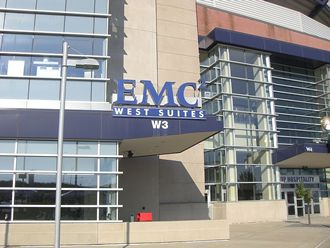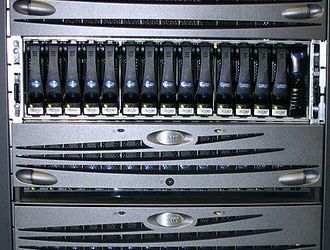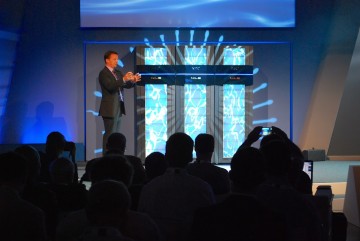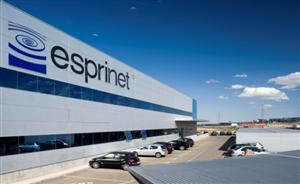 EMC hit the hyperbole when it released a refresh of its new mid-range data centre products.
EMC hit the hyperbole when it released a refresh of its new mid-range data centre products.
Rich Napolitano, President, Unified Storage Division, EMC told the product launch in Milan yesterday that when people look at the history of datacentre computing they will see this particular product launch as the “day everything changed.”
To be fair the outfit has a lot to be proud of, if even half the stats for the VNX series are true.
The outfit has been the leader in the market with its VNX boxes which are for companies who want a data centre.
According to EMC President and Chief Operating Officer, David Goulden the rise of mobile data has made the data centre a vital part of any IT plan. Huge amounts of data were flowing into the company which not only needed to be stored, but also used.
One of EMC’s customers, Enrico Parsini, from Conserve Italia, said that active use of the datacentre within his company was being seen as a way of driving down costs for the rest of the business. This was particularly important in his company which has seen a three years of falling prices in the food industry.
VNX products are based on the idea that if you make Intel’s Sandy bridge cores more efficient and make SD cards run on special software rather than traditional HD methods you can make data centres go like the clappers for less energy and cost.
If what EMC says is true, its channel partners will be able to sell their clients a cheaper box than what they would have previously bought, and still see data centre speed improvements of about 50 per cent.
The product puts other hardware makers on the back foot. While they have been touting the use of virtual computers, some even have hybrid systems for sale, they do not have the speed options of the EMC machines.
EMC said that many people were expecting it to just announce a refresh of the product, when it actually announced that it was going to change everything.
This is partly because the hardware is ahead of the competition and is already gearing up for its next generation.
It is the first time that we have heard of companies coming up with a use for Intel’s multicore products and making them work properly. With Chipzilla planning more cores on its chips in coming months, EMC will have an easy upgrade path.
Part of the product’s success has been because of the involvement of Cisco and VMWare.
Satinder Sethi, Vice President, Data Centre Group, Cisco said that his company partnered with EMC to speed its customers’ journey to the cloud. These include allowing custom-designed infrastructure, validated reference architectures via EMC VSPEX Proven Infrastructure, and pre-integrated converged infrastructure with VCE Vblock Systems.
Cisco kit and software integrated with offerings from EMC and VCE have generated significant momentum with customers and partners.
“Cisco and EMC have hundreds of joint channel partners and thousands of joint customers around the world. Together, Cisco and EMC plan to accelerate this success with our mutual channel partners,” he said.
He added that EMC’s next-generation VNX technology will complement Cisco’s Unified Compute and Unified Fabric solutions, helping customers maximise their existing infrastructure and further simplify cloud deployments.
 Revenues from the worldwide storage software market rose by 6.3 percent in the second quarter of this year, according to figures from IDC.
Revenues from the worldwide storage software market rose by 6.3 percent in the second quarter of this year, according to figures from IDC.

















